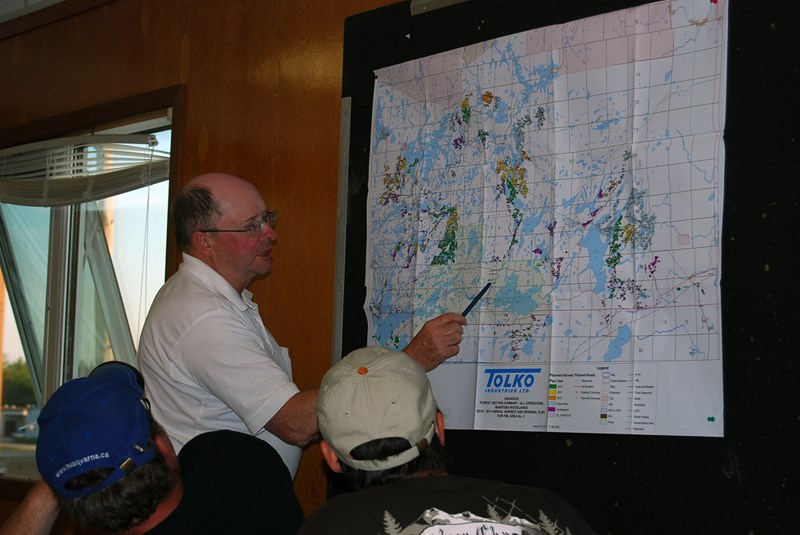Five people were in attendance for Tolko Industries' Sept. 14 meeting at the Lawrie Marsh Hall. Chaired by Doug Hunt, Tolko's woodland's manager, who was accompanied by Paul Chapman, Tolko's silviculture forester, the meeting was consultative in nature, and was held to advise locals of the approval of Tolko's environmental licence, allowing them to build 17 kilometres of road through Grass River Provincial Park. The all- weather road in question will run from the Chisel Lake rail bed (near Dickstone Siding) to Highway 39.
Hunt commenced by stating that some time back the company had been faced with the question of how to move timber out of future cuts in the Burntwood-Loonhead Lake area. "When the rail bed became available, it was purchased from HudBay (Minerals)," Hunt said.
On March 10, 2008, Tolko applied for the environmental license that would allow them to build the road from the rail bed to Highway 39, and after supplying additional information in July of that year, they were eventually granted the permit on Aug. 12.
With that permitting in place, Hunt says that the company will begin to cut the right of way for the road this winter and proceed with construction in the summer of 2010. They hope to be far enough along in the process to build a bridge over the Grass River in March 2011. That bridge will be 40 metres in length, constructed on steel and concrete, and will cross the Grass between Loucks and Reed Lakes.
The road from the rail bed to Highway 39 will be used exclusively by Tolko and the contractors who haul logs to their mill in The Pas.
To ensure these are the only people using it, the environmental licence stipulates that state of the art gates be placed at both the north and south access points. "These gates will have electronic control systems that will allow a trucker to wave a card from about two feet away to gain access," said Hunt. "The area will also be set up with security cameras that can be viewed in real time." Commenting on the environmental process inside the boundaries of parks, Hunt stated that Tolko wished that they could get the same consideration that the mining industry receives. "They drill in a buffer and nothing is said, we cut trees down in a buffer and we are charged," he lamented.
Though there were only five people at the meeting, there were a number of questions for Hunt and Chapman, most of which were directed towards cutting plans for the Snow Lake area. Hunt advised that the province had banned cutting in their parks (other than Duck Mountain) in March, so there wouldn't be any harvesting in the Grass River Park; however, they noted that if the sawmill opened again, there was some excellent timber in the Tramping/Woosey area.
The most likely areas that would be cut in the near future are east of Wekusko Lake and in the Dolomite Lake region. Hunt stated emphatically that they would not be going into the Osborne Lake region anytime soon.
One meeting attendee noted that the proposed road was advantageous to the people of Snow Lake, as it meant close to 20,000 truckloads of pulp would not be pounding down local roads. Conversely, another resident noted that with Tolko putting gates up on the rail bed, this would impede the fishing and other outdoor activities of the traditional users from Snow Lake.
The meeting ended approximately an hour after it began, with attendees leaving with the impression that the gate on the rail bed would go up soon and the road right of way would be cut later in the winter.
However, it was later reported in the Winnipeg Free Press that a group called Wilderness Committee has filed an appeal of the licence. The Wilderness Committee is Canada's largest membership-based, citizen-funded wilderness protection group.




